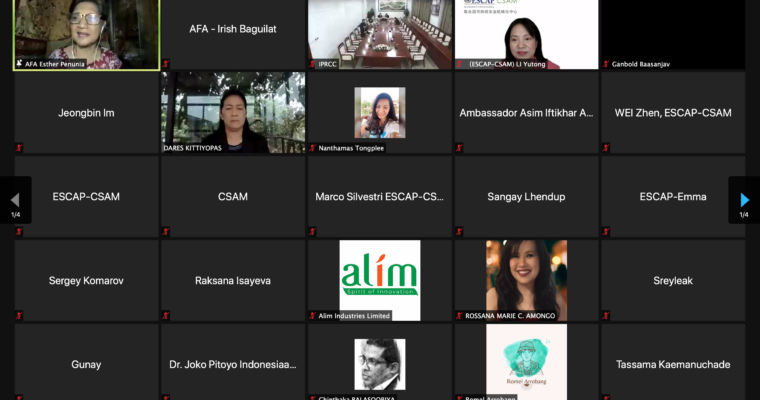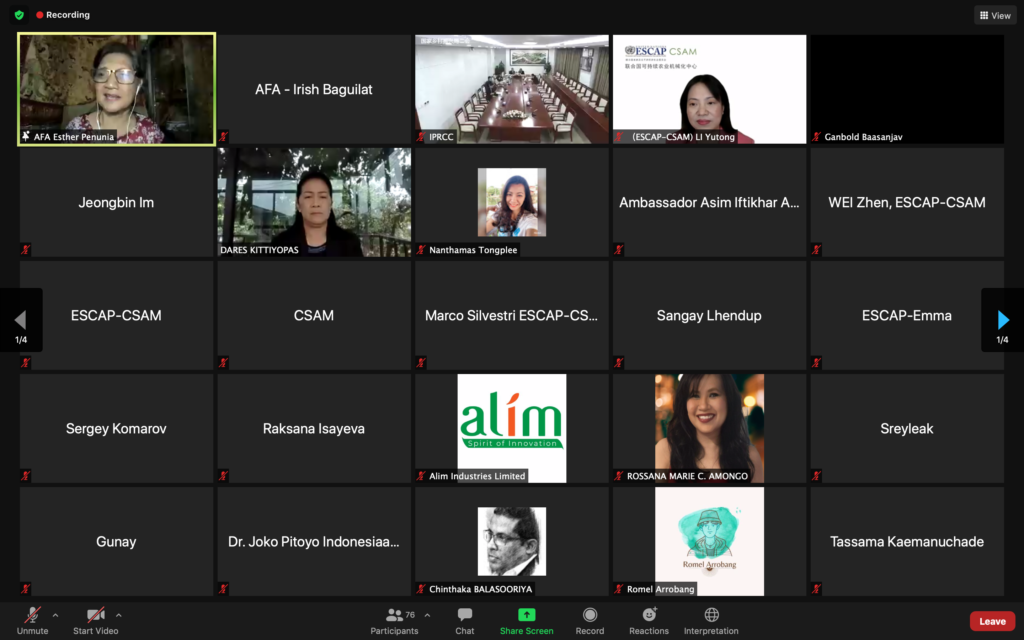“We envision a food system that promotes equal rights and equitable opportunities for women farmers, and views family farming organizations as partners,” said Esther Penunia, Secretary-General of AFA, on behalf of AFA constituencies, in her intervention. On April 28, 20201, Penunia participated in the Food Systems Summit Independent Dialogue co-organized by the Permanent Mission of China to ESCAP and the International Poverty Reduction Centre in China (IPRCC) during the 77th session of the Commission hosted by the Centre for Sustainable Agricultural Mechanization of the United Nations Economic and Social Commission for Asia and the Pacific (ESCAP-CSAM).
The event titled, “Linking the achievement of SDG1 and SDG2 to build back better: Poverty alleviation through sustainable agricultural development and rural revitalization” invited panelist that discussed the following topics: rural poverty reduction, alleviation pathways taken by South Korean, China, and Thailand; digital innovations as implemented by Alibaba and ways to empower family farmers and food producers. The organizers proposed that building synergies between poverty alleviation achievements and rural revitalization are key to prevent people from sliding back into poverty when faced with shocks and to build back better while tackling the targets set out for SDG1 and SDG2.
Alongside Ms. Penunia were Jeong-bin Im, Department of Agricultural and Resource Economics of Seoul National University; Tan Weiping, the Deputy Director-General of IPRCC, Xiang Huangmei, the Vice President of Alibaba Group; and Kittiyopas Inspector-General of the Ministry of Agriculture and Cooperatives, and President of Thai Society of Agricultural Engineering.
Ms. Penunia stressed the following key messages:
- Our food system is broken and this has been dramatically exposed during the COVID-19 pandemic. It is a system where food is produced faster than global population growth, and yet there is poverty, hunger, and malnutrition including obesity, biodiversity loss, soil and ecosystem degradation, air, water, and sound pollution, and where the youth is unattracted to agriculture and where small scale producers and family farmers have weak control of the food system. Family farmers are regarded as food heroes yet victimized by weak access to markets and low prices of their produce.
- There is a need to shift to a food system that achieves multiple wins – one that not only raises productivity and incomes, but also protects the environment, increases soil health, biodiversity, resiliency, and adaptation while mitigating climate change, strengthens health and immunity to diseases, provide access, make available and affordable health and nutritious food, while reducing food waste, and eliminating hunger and poverty, and that links the rural and urban populations, the farmers and consumers, in a web of life that is interconnected and interdependent.
- Yes, it is possible, South Korea did it! With a mixture of the right policies, sufficient budget, effective leadership and governance, and empowered citizenry, including family farmers. We need policies that secure access and control of family farmers over production resources, mainly lands, waters, forests, seeds; and policies that incentivize family farmers to shift to sustainable agroecological approaches to farming, to organize into cooperatives providing full value chain services to their members, to attract the youth to go into agriculture and further do agricultural innovation.
- Participatory policy-making processes increase the policy’s appropriateness and relevance, stakeholdership, ownership and responsibility, deepening trust and partnership among stakeholders involved.
- The years 2019-2028 is the UN Decade for Family Farming or UNDFF, which has developed a global action plan aimed to accelerate actions undertaken in a collective, coherent and comprehensive manner to support family farmers. It has seven pillars of action, the first one is to develop an enabling policy environment to strengthen policy on family farming, based on inclusive and effective governance processes. Pillars 2 and 3 are on youth and women farmers, and Pillar 4 is on strengthening family farmers organizations.
- For the Food System Summit, we are asking the government to facilitate the empowerment of family farmers, by developing and implementing national and regional action plans for the UNDFF, through a multi-stakeholder process, that recognizes and targets small scale family farmers and their groups and organizations, not only as beneficiaries of these policies but also as equal partners in crafting and implementing policies and programs.
- A key step to the empowerment process is investing and directly financing family farmers organizations to support their choices on capacity building, policy engagement, and delivery of services to their members, and enabling them to have effective internal governance and management, as our experience with development partners IFAD, FAO, and GAFSP, will be a key step to the empowerment process.
- Empowering family farmers means recognizing and making true to the belief that family farmers should be at the heart, and the center of sustainable and empowering food system processes, and their organizations should be a key driver and a key force in the process.
Watch the session here:





Comments are closed